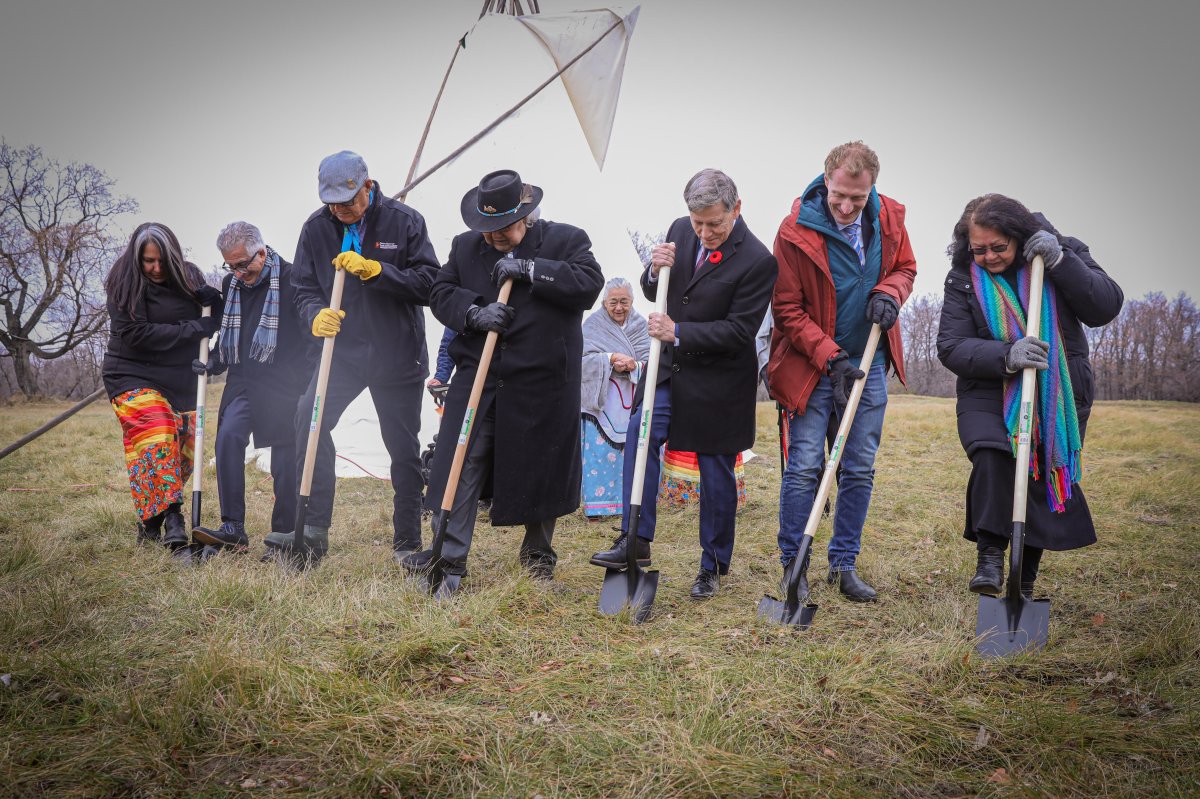This is the fourth and final story in a Global News series called Journey Towards Reconciliation. To see previous stories, click here.

Young Indigenous people in Canada have inherited the impacts of residential schools through intergenerational trauma, and now the work towards reconciliation is also being passed down.
Many Indigenous communities believe in the Seventh Generation Principle, which dictates that the decisions we make today should have a positive impact on the world seven generations into the future.
So what does that mean when it comes to the journey towards reconciliation?
Jennifer Wood works with the National Centre for Truth and Reconciliation in Winnipeg.
On Jan. 20, 2022, the NCTR signed a memorandum of understanding with the federal government, making the organization the steward of the records, archives and other historical documents related to residential schools that are in Canada’s possession.
“We couldn’t be at a better place in our history,” Wood told Global News.
The mission of the NCTR is to support residential school survivors, conduct further research into the children who didn’t come home and educate Canadians and others about the residential school system and ongoing impacts of colonialism on Indigenous people.

A new facility for the NCTR will be built on land donated by the University of Manitoba, on Treaty 1 territory and the homeland of the Métis in that area.
“We welcome the public to come into our ceremonies to be a part of it,” Wood said. “By all means, come in to appreciate it and learn.”
Wood said she wants people to sit down and learn with Indigenous people and walk on the road to reconciliation together.
“That’s what healing is all about,” she said.
Wood is a third-generation residential school survivor. Her grandmother, mother and siblings also attended. Five of her siblings were taken in a sweep as part of the Sixties Scoop.
The Sixties Scoop refers to a period between the 1950s and 1980s, after amendments to the Indian Act let provincial governments take over Indigenous child welfare responsibilities.
Thousands of First Nations, Inuit and Métis children were taken from their birth families, usually without consent, and placed in non-Indigenous homes.
Wood said she would like to see more records released to help residential school survivors — including her own — and their families learn more about their own history.
“I want to have something that I can leave to my grandchildren to say, ‘My people, my family, went to residential schools,'” she said. “They endured it, they’re survivors, and now they are thrivers.”
“We are a part of the legacy.”

The construction of the new NCTR facility will be just one step aimed at helping to educate Canadians on the history of residential schools and Indigenous people in Canada.
“We want to leave a legacy and factual information — the accurate information, the historical information,” Wood said.
“We want to leave it to our children who will be walking in our paths and speaking up for us in the legacy of residential schools.”
One of those children who is now walking that path is Ocianna Clarke.
Clarke is a 16-year-old student at Boyle Street Education Centre, a charter school in Edmonton that takes a “trauma-informed approach to education.”
Her father was a residential school survivor.
“My biggest inspiration has been my dad,” she said.
“He’s been through so much and through all of that he stayed resilient.”
The school offers many classes that go beyond the normal education system, including a program called Indigenous Cultural Experiences, which encourages students to embrace their culture — from sweat lodges to daily smudging ceremonies.
There are also classes offered in music, drama, fashion, cooking, yoga and art.
“On my first day, I actually cried,” Clarke said. “I was scared of starting over.”
Clarke was a year behind in her schooling when she enrolled, a month after Pope Francis delivered his apology to residential school survivors.
She said the teachers there have helped her get back on track and she has accomplished more in the last five months than she thought possible.
“I think it’s really important for Indigenous youth to stay in school and get an education,” Clarke said.
“We have to show that we are capable.”
The students at Boyle Street Education Centre have complex histories, from trauma, to loss and abuse.

Clarke is looking towards a career as a social worker, counsellor or political scientist. She told Global News it’s important for there to be representation of the Indigenous community for those careers to motivate others.
“Obviously, everyone should get that, but sometimes we have to fight harder (so) that we are capable of (those things).”
“In 10 years, we should be able to openly discuss (residential schools),” she said. “I really hope that the Indigenous community will be thriving.”
Clarke said for her, the most important thing will be making her dad proud after everything he’s been through.

The Indian Residential Schools Resolution Health Support Program has a hotline to help residential school survivors and their relatives suffering trauma invoked by the recall of past abuse. The number is 1-866-925-4419.




Comments